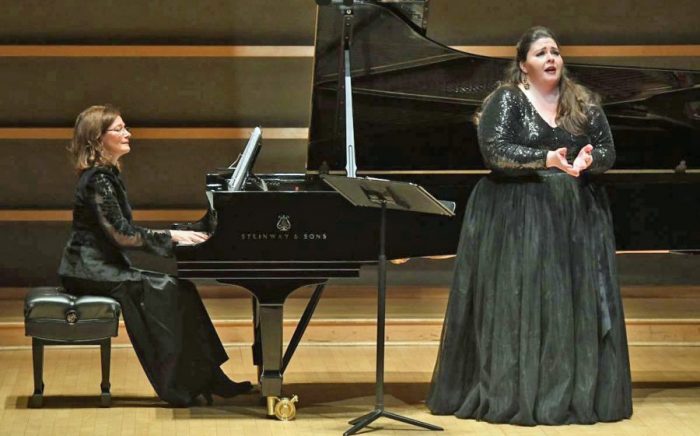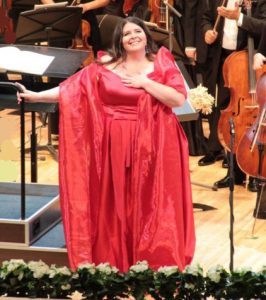
Angela Meade’s January recital in Philadelphia (repeated in Santa Fe a few days later) was a revelation. The soprano has been so busy on opera stages, and with symphony orchestras, since her 2008 Met debut in Ernani that intimate appearances have been scarce.
This recital with pianist Danielle Orlando for the Philadelphia Chamber Music Society followed the classic format of contrasting groups of songs in varied languages, with a brief taste of opera at the end. Opera celebrities in the old days would regularly bring such recitals to concert halls around the nation, presented by impresarios like Arthur Judson and Sol Hurok, and I hope this event represents a resurgence of that genre.
On this occasion, Meade’s voice had the accuracy and beauty that opera lovers have come to expect, plus more color and temperament than we’ve heard previously. She appeared in a flowing red gown in the first half of the recital, and in black after intermission.
From the start, Orlando was a co-equal star. Not only is she the highly-respected vocal coach for major opera performers, she has formidable piano technique. Her rippling dance rhythms and rolling arpeggios introduced four songs by Giacomo Meyerbeer. Despite his Italian first name and his German-Jewish family name, Meyerbeer was the creator of extravagant French grand operas which are in neglect these days. Even less known are these romantic ballads from the mid-19th century with lyrics about clouds, stars, larks and sparrows. Meade’s graceful renditions provided interesting listening and her French accent and placement were excellent.
The purpose of including multiple styles is to demonstrate a soloist’s openness to diversity and, by example, to lure audiences into a similar exploration, rather than concentrate on material that the singer is famous for. That seemed to be the motivation for Meade’s inclusion of Gustav Mahler’s five Rückert Lieder, based on poems by Friedrich Rückert, composed in 1901 and 1902. Mahler intended them for a baritone voice accompanied by orchestra. They’ve often been sung by mezzos, and they inevitably lose some gravity when transposed for a higher voice where Mahler’s dark coloring is inevitably lightened. Orlando’s superb keyboard artistry nevertheless left us yearning for Mahler’s orchestral timbres, especially his woodwinds and brass.
The songs are intimate. Breath control and seamless legato are required, and Meade certainly delivered that. Her interpretations were melancholy and peaceful. “Um Mitternacht” (“At Midnight”) was a highlight with its hushed evocation of a mysterious night although others have found more pain in the early stanzas. In a touching “Ich bin der Welt abhanden gekommen” (“I have lost touch with the world”) she projected the serenity that accompanies the singer’s withdrawal into a private existence.
Meade’s German repertoire also includes Korngold and Richard Strauss songs, and I’ve seen her onstage in Weber’s Der Freischutz. Perhaps some mid-period Wagner would be effective in her future.
Two mellifluous love songs by Bellini were as lovely as one would expect from a woman who has triumphed in that composer’s Norma. Contrast came with Beethoven’s “Ah, perfido,” one of the strongest presentations I’ve ever heard of this dramatic scene which accuses a former lover of betrayal and perjury. Meade’s delivery was incisive, with full-bodied tone and rhythmic propulsion. While every critic praises Meade’s beautiful tones, some have accused her of sounding too placid. She broke through that barrier emphatically here.
Only one opera excerpt was on the program, and it was spectacular. “Bel raggio lusinghier” (“Beautiful ray of hope”) is the big number in Rossini’s Semiramide, which is being revived for Meade at the Metropolitan Opera February 19. She displayed explosive rapid fireworks, with long unbroken phrasing and stunning upward leaps. If she repeats this breathtaking performance onstage at the Met, expect the biggest ovations of anything this season, comparable to what we heard when Joan Sutherland sang Lucia in 1961. Speaking of which, I enjoyed hearing Sutherland sing “Bel raggio” — and Meade’s rendition this week was more exciting.
Below, Meade in red,
